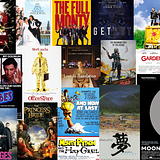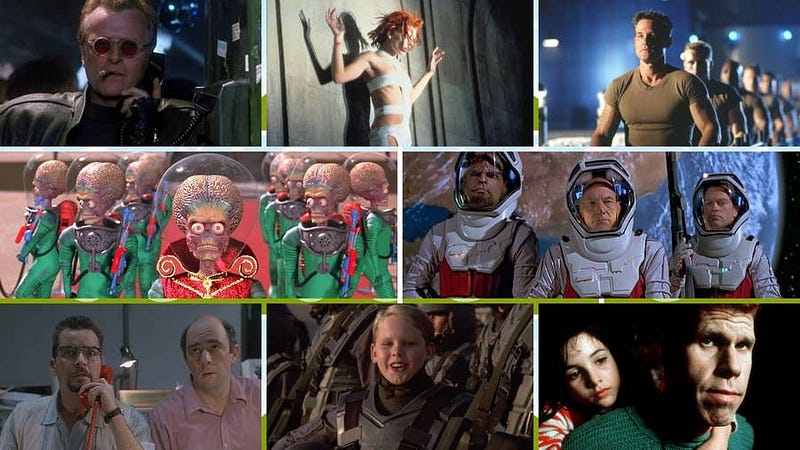Once upon a time, Netflix’s DVD library hosted well over 100,000 titles and sent out roughly 12 million DVDs per week. Now, with the advent of easy-to-use streaming services, the amount of content viewers have available has shrunk to the low thousands.
Look up any list of “films to watch” and you’ll find a tiny selection of movies, usually curated by people all reading the same lists and commenting on the exact same hot new show or film.


But, is that all there is? With over a hundred years of incredible filmmaking on the planet, isn’t there something missed when we only pay attention to the latest and greatest? This series is dedicated to answering that question and to exploring a small handful of the unsung films from decades past. I’ll examine each decade in turn, all the way back to the earliest days of film, and I’ll be exploring every genre of film there is! From science fiction, to drama, to romance, to comedy — I’m going to cover the entirety of film history for you, bringing out the golden nuggets for you to enjoy.
Science fiction
Today, our topic is science fiction of the 1990s, a glorious decade that saw the release of some of the biggest blockbusters of all time, like The Matrix.
This decade also featured a huge range of strange, trippy, and frequently brilliant science fiction films that audiences-at-large never had a chance to see. A few of these you may recognize, especially if you’re already a science fiction fan. However, I think a couple might not be on your radar — and a few others might be forgotten gems that you suddenly realize you’ve been wanting to see.

As always, with these articles, I love hearing your feedback in the comments section. Let me know what your favorite films of the decade were, which ones you think I should have included, and which you hope I’ll mention in one of my next decades! Have you written your own article about your favorite films? Share it with me: I’d love to read!
The Fifth Element (1997)

I am continually amazed by how people have never seen this absolute gem of a film. Seriously, it’s one of the best science fiction movies ever made — and it’s become a massive cult favorite — but it somehow slipped by the vast majority of viewers. What’s especially weird about this is that, although it’s science fiction, it’s funny and has an incredible cast, making it super accessible even to people who don’t normally watch much from my favorite genre.
An opera in the stars… a space-opera, that is!
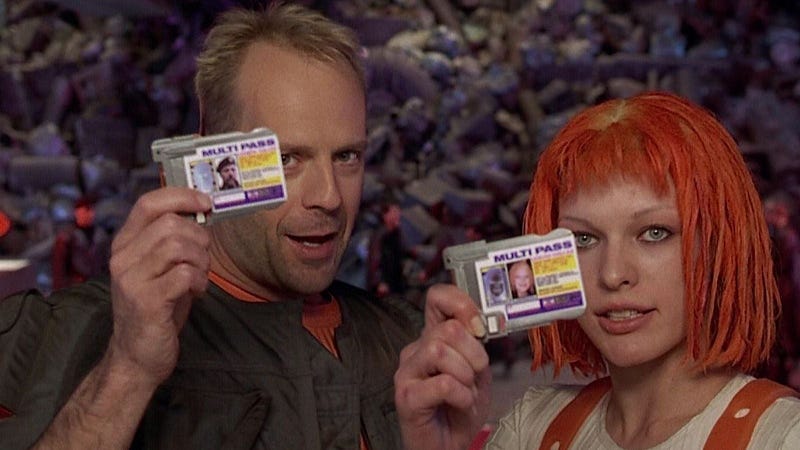
The Fifth Element is the tale of a young woman (Milla Jovovich) who crash lands through the roof of a 23rd century cab driver (played by Bruce Willis). With this, the final battle for the future of humanity begins, as an ancient intergalactic evil awakens — an evil that can only be halted by the mysterious Fifth Element.
Wedlock (1991)
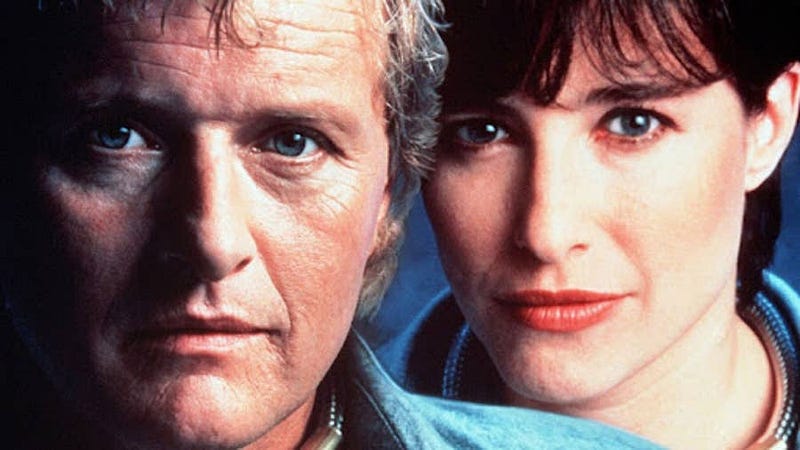
Rutger Hauer was always my favorite actor, ever since his impressive performance in Blade Runner. But, while he made a massive splash in that film, much of his work remained more in the realm of cult films and low-budget dramas — a shame, considering how good of an actor he was. Yet, at the same time his work in these classic, often cheesy films, helped uplift them to their classic status and makes them a treat to watch as part of a late-night watch party.
You’ll be locked to your screen
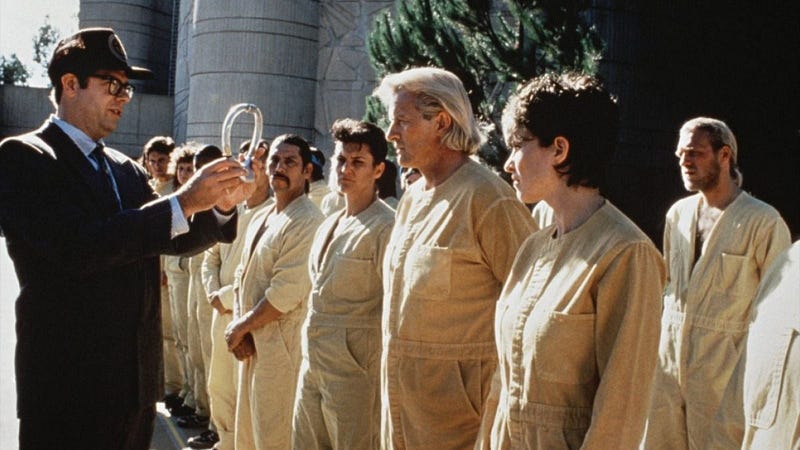
Wedlock concentrates on Frank Warren, a diamond thief who gets shot after hiding the haul from his latest heist. Sentenced to 12 years in a new type of high-tech prison where the prisoners are locked to one another by radio-linked explosive collars, Frank, and his wedlocked partner must find a way to escape, get the diamond haul, and survive while doing so.
Starship Troopers (1997)
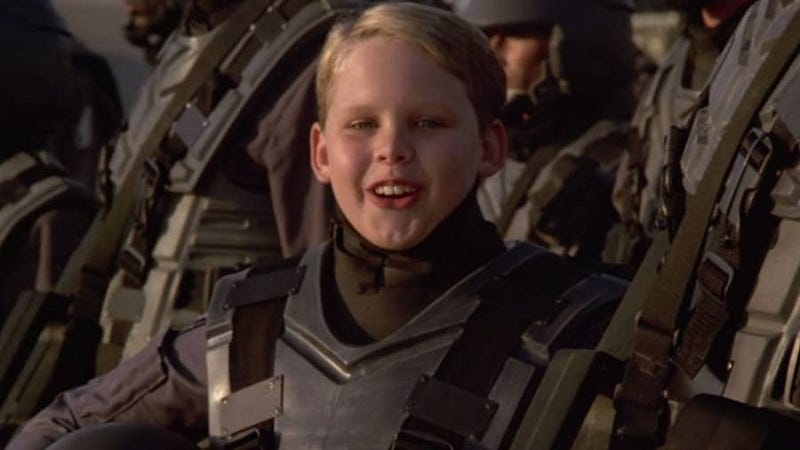
If you’re a Heinlein fanboy, you ain’t gonna dig this one, lol.
An example of a brilliant satirization of an extremely overblown original work: Starship Troopers took the original story by Robert A. Heinlein (which was basically just a vehicle for Heinlein’s absurd political views), and made it into something far more clever — and simultaneously cheesier. Turning a classic piece of pro-war propaganda into a self-reflexive allegory is no easy feat, but Paul Verhoeven was up to the task. The director used several brilliant techniques, including recreating, shot for shot, a scene from Leni Riefenstahl’s 1935 Triumph of the Will (a pro-Nazi propaganda film).
When Verhoeven was asked by actor Michael Ironside why he was working on source material that was intrinsically fascist, the director said: “If I tell the world that a right-wing, fascist way of doing things doesn’t work, no one will listen to me. So, I’m going to make a perfect fascist world: everyone is beautiful, everything is shiny, everything has big guns and fancy ships, but it’s only good for killing fucking Bugs!”
The only good bug is a dead bug!
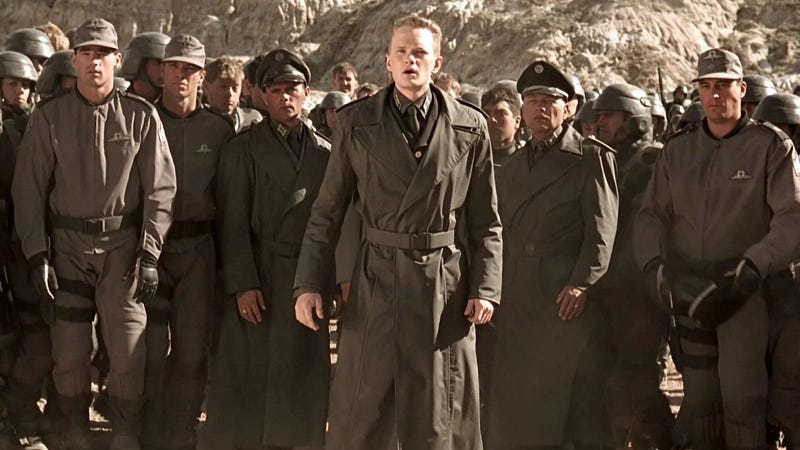
Starship Troopers explores the life of John “Johnny” Rico, who joins up with the Federal Service military when an alien species attacks Earth, destroying his home city. Geared up and ready for war, Rico, and his classmates join the front lines as groundpounders, only to find that war against the “bugs” might not be as simple as their superiors had described.
Star Trek: First Contact (1996)
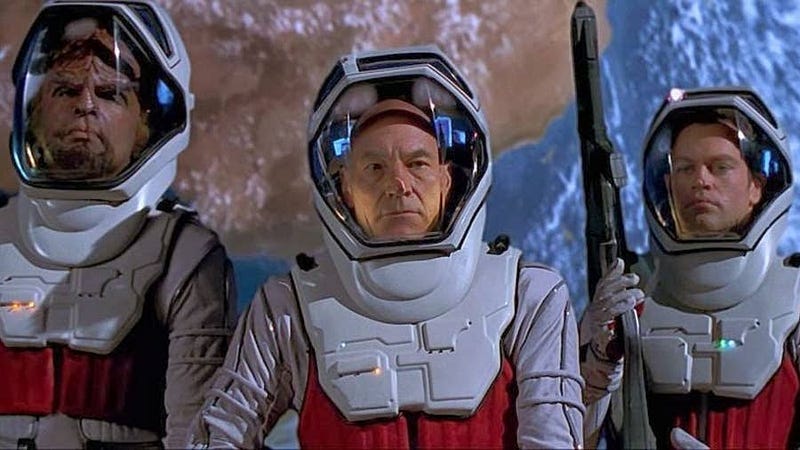
Star Trek isn’t exactly an unknown item these days, but First Contact is one of the films that is dearest to my heart. It was contrived as a paper-thin a blockbuster, but it ended up being one of the artistically best Trek films.
Despite attempts by certain parties involved in its creation to use First Contact as a vehicle for discrediting Roddenbarrian ideas they viewed as “utopian,” this film managed to present some of the most potent summations of true Federation idealism. Thanks to a wonderful cast, the film felt driven and delightful, mixing subtle humor with passionate emotionality. Adding in elements like the Borg Queen were, arguably, not great choices, but others, like Picard’s bold speech about the nature of economics in the future, were accidentally amazing.
Resistance IS futile (you will love this film)
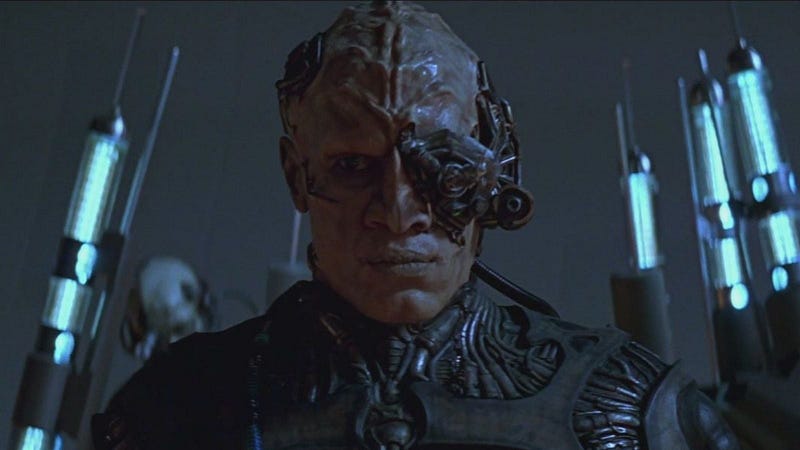
Star Trek: First Contact is the story of the end of humanity. The Borg, a collective of species modified against their will and subjugated by a ruling cybernetic mind, have traveled through time to assimilate Earth at its weakest point (immediately following World War Three). The crew of the spaceship Enterprise travel back in time to stop the Borg, but find themselves embroiled in the Borg’s plot as well. Soon, they discover that some of their heroes from human history might not be quite as helpful in the resistance as they had imagined.
Galaxy Quest (1999)
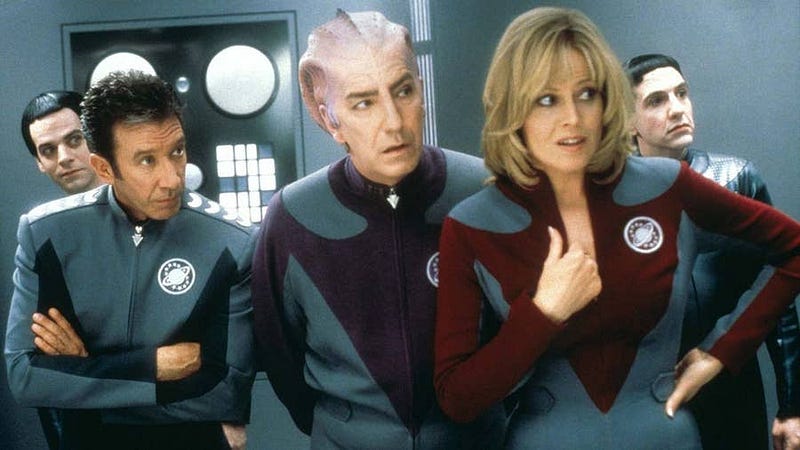
Galaxy Quest is, quite possibly, the greatest film ever made — a wonderful masterpiece of comedic genius, with a delightful cast, snappy writing, and gloriously wacky directing. It is — without a doubt — the cult film to end all cult films. Personally, I think it’s important to note that this is a science fiction satire that did a good job of actually getting humor right. Most modern comedy series are, frankly, mean. The jokes that would have been used if this film were made today would be outrageously crude, rude, and lewd — and that’s not a good thing. The charm of Galaxy Quest is in its subtlety and, in a wonderful zany way, its reverence.
Never give up, never surrender
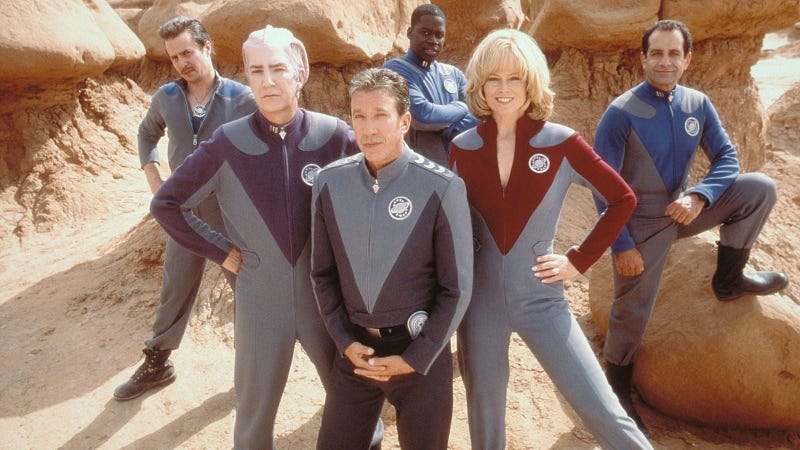
Galaxy Quest tells the story of a group of actors from a hit television science fiction series who… never got beyond being actors from a science fiction television show. Washed up, doing car commercials, they feel like their careers are going nowhere. Only, the show isn’t just a show to everyone — certainly not the alien species who, upon intercepting episodes of the TV series, believed it to be factual history. What happens next is an adventure unlike anything our unlikely heroes could have imagined.
Escape from L.A. (1996)
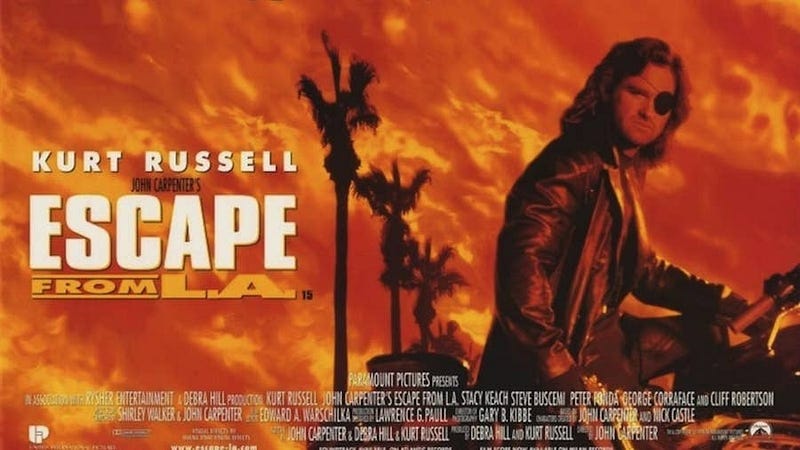
On the heels of Escape from New York, John Carpenter’s incredibly successful film set in the same world, Escape from L.A. takes an over-the-top approach that turns it into a wonderful satire of both the genre itself and the entire Hollywood industry of the era. It manages to be delightfully subversive in its exploration of social themes, which are driven by a madcap thrust of action that slams the plot through every barrier it comes across. It is campy, but it knows that it is campy, and it leans into the knowledge to great effect.
Call me… Snake
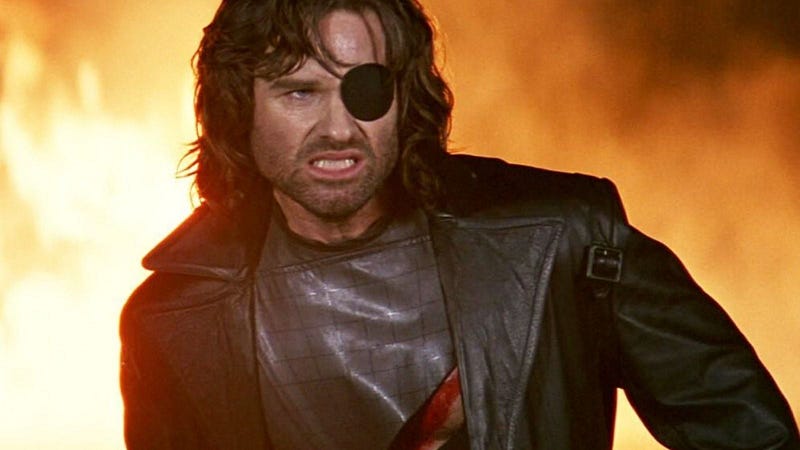
Escape from L.A. is the second story of Snake Plissken, a war hero who became an anti-hero when the world he’d fought to protect became a totalitarian nightmare. Now, saddled with a mission he doesn’t want and doesn’t have any choice in, Snake needs to race against the clock to save the world one last time… possibly from itself.
Soldier (1998)
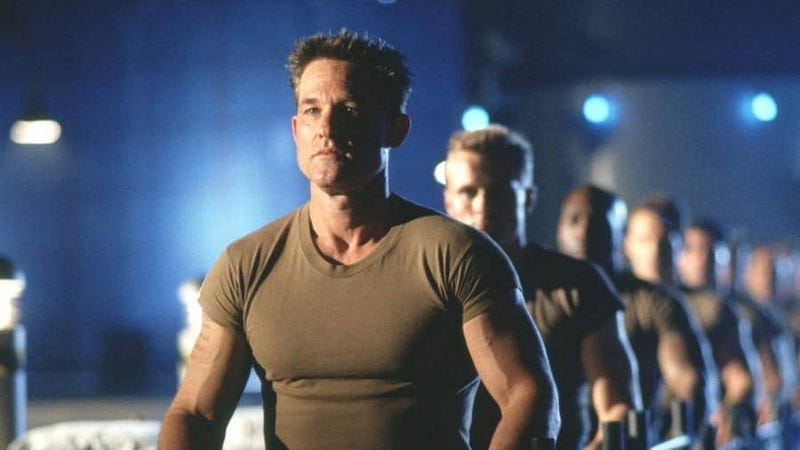
Military science fiction is a fascinating genre and one that, I feel, works best when it provides a subversion to tropes of militarism (something the genre frequently does do, often in the midst of plots dealing with big explosions). There’s a lot in this film that I enjoy, from the action to the wonderful “badness” of the military officials who condemn innocent people to death for their own ends. It’s delightfully low-budget and is unashamed of itself, which allows for a fun viewing. Is it clichéd? Definitely, it’s one BIG cliché, but for this film that’s somehow okay.
Soldier on through the clichés
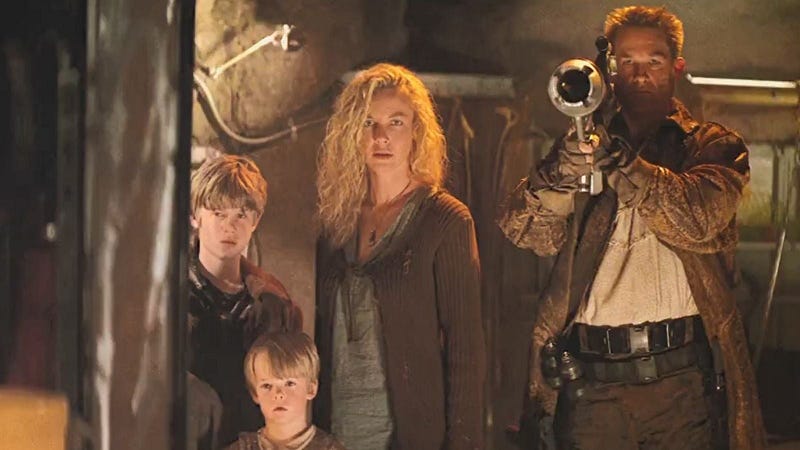
Soldier (1998)
Soldier is the story of Sgt. Todd 3465, a soldier raised since childhood to fight and kill. Only, the needs of the military eventually see him disposed of as a new class of genetically engineered soldier are fielded for war. Left for dead on a junkyard world, Todd finds himself adrift, at the mercy of a group of civilian squatters living in the shadows. Emotionally stunted, he must relearn what it means to be human, but his life as a soldier might not remain as far away as he supposed… Not for long, anyway.
The Arrival (1996)
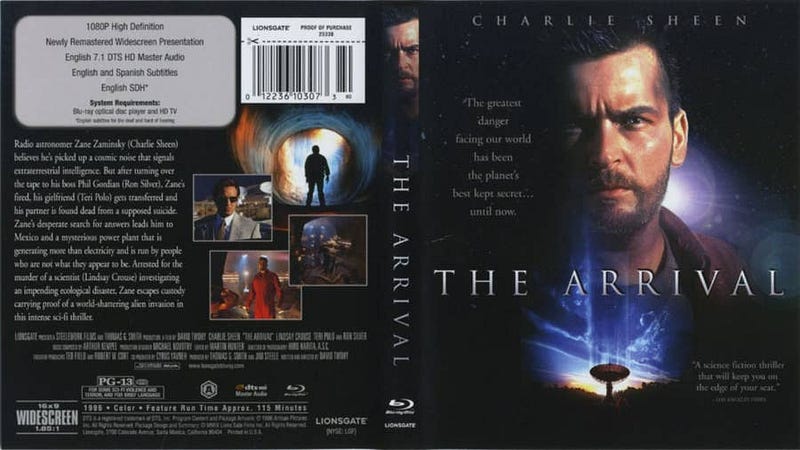
I generally avoid thinking about anything Charlie Sheen does, but this is one of those important cases where artist and art needs to be separated — or, weirdly, a case where the artist’s personal problems become what possibly makes the art so strong. I mean, Sheen is totally believable as a crazed conspiracy theorist, and this little humdinger of a film takes a fun new stab at the alien invasion plot through his character’s eyes. The Arrival was totally overshadowed by Independence Day, but it held up in its own little cult way and shouldn’t be ignored.
A signal never meant to be heard…
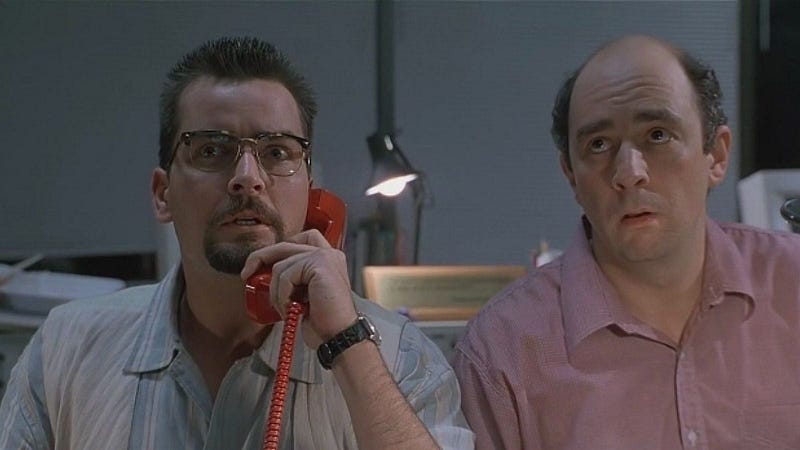
The Arrival concentrates on Zane Zaminsky, a radio astronomer who discovers a signal of alien origins… only, the location doesn’t appear to be an alien world at all, but Earth herself.
Johnny Mnemonic (1995)
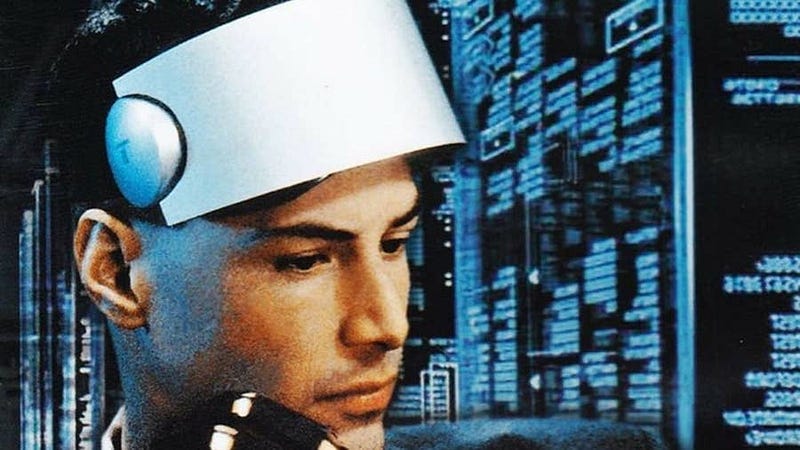
Leaving aside the fact that so much of the tech and tech assumptions in this film are woefully out of date (and, frankly, were out of date already when this was written), Johnny Mnemonic powers through as a cyberpunk action epic that showcases some really fun 90s visuals and Keanu Reeves’ signature Stoic acting style.
It’s not without many massive flaws, don’t get me wrong, but if you go in expecting it to be what it is, you might come out having had a very enjoyable time indeed.
There are also two interesting versions that exist in alternate states the Japanese edition (which adds a fair amount of story material and footage back in from the American cut), and the 2021 black and white version that adds some powerful noir magic to the work.
He’s only got eighty gigabytes of childhood memories and he wants them back
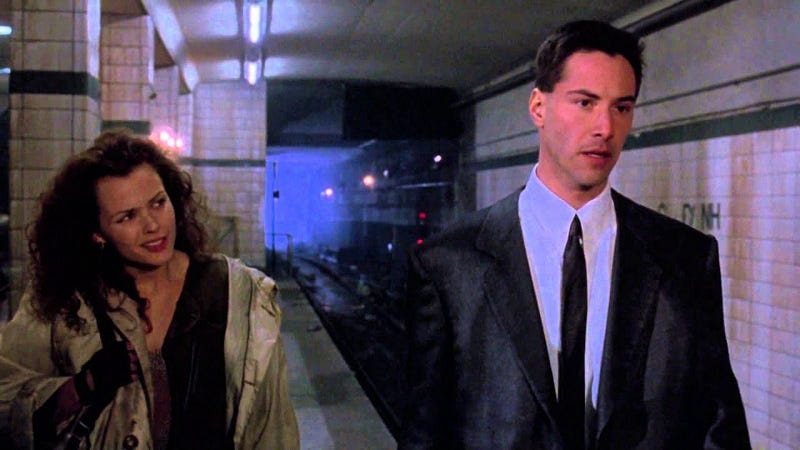
Johnny Mnemonic is based on the story of the same name by William Gibson, master of the cyberpunk genre. In a dark distant future (the year 2021) the world is devastated by a pandemic while mega corporations rule the Earth… and… wait, is this supposed to be fiction? Okay, anyway, Johnny is a courier of data that he carries inside his own mind — but carrying data is a dangerous task and someone wants Johnny’s head for themselves, without his body attached.
Existenz (1999)

Here’s a film that still smacks of intelligence all the way through, though that makes sense with David Cronenberg at the helm. A delightfully twisted and weird sci-fi story that bends reality and drives at the heart of philosophic questions about the nature of mind, body, and soul. It got ignored due to The Matrix, but it remains an epic little work, with some sterling performances by its cast and a script that refuses to quit.
The ultimate escape… to where?
Existenz is the next-generation biotic video game creation of genius Allegra Geller, who becomes an assassination target by an extremist group bent on the destruction of these organic games.
Tank Girl (1995)
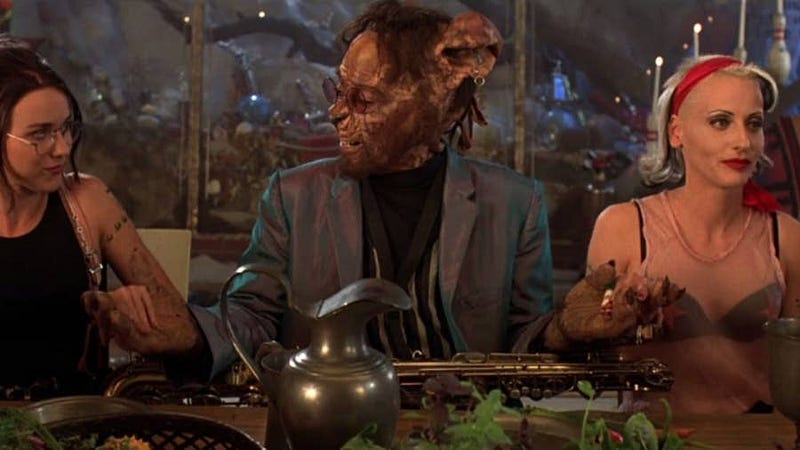
Despite bombing in the box office (due in part to its subject matter and style as well as to invasive studio edits forced on the director), Tank Girl remains a cult favorite with vital feminist themes that presaged the likes of Mad Max: Fury Road. It’s madcap, super zany, really weird — and it somehow strikes a perfect balance of cult goodness in the middle of it all.
“Remember the girl next door? I ran her over.”
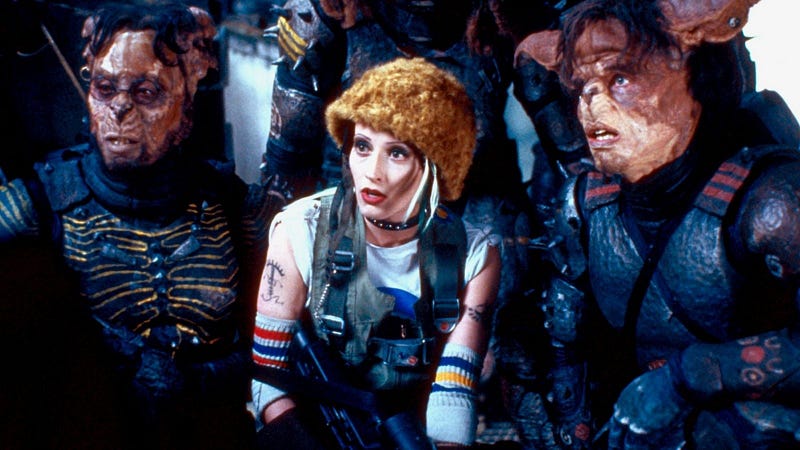
Tank Girl follows the anti-hero “Tank Girl” as she and her allies fight against the evil Water&Power corporation, hell-bent on keeping the last of the drought-ridden Earth’s water for themselves.
The Faculty (1998)
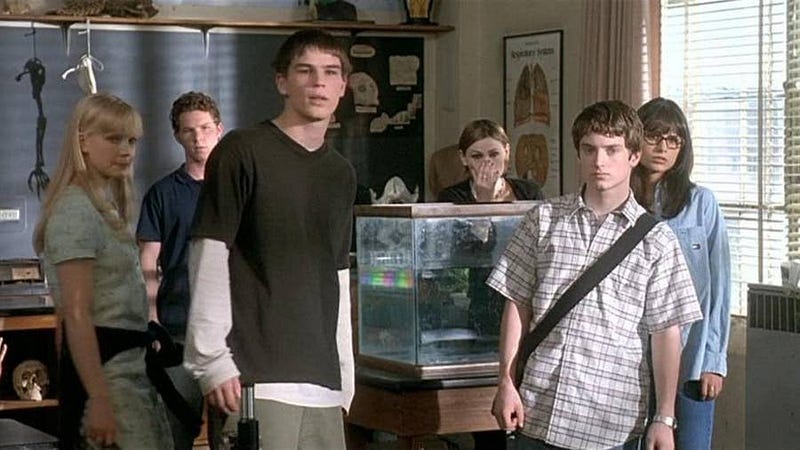
Beyond the fact that it’s got a young Elijah Wood in it, this film is wonderful in so many ways, despite being basically the same as many much-better-known films. This does, I think, come down to the inherent satirical vibe of the film, which gives it an endearing and enduring quality, but also to the strength of the entire cast’s performance, which just simply shines. The truth is that most of the critics who panned it simply weren’t that bright because they tried to judge it as a self-serious film when they should have been reviewing it as a self-reflexive one.
School’s out… forever.
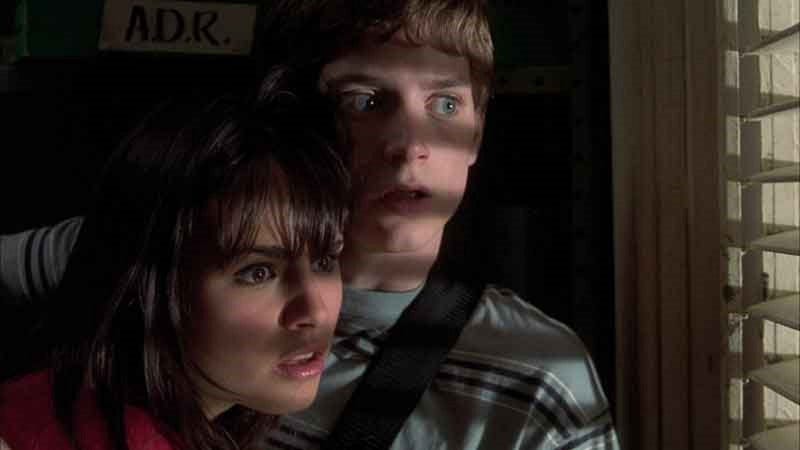
The Faculty of Herrington High School in Ohio are not what they seem, and it’s up to a group of teens to figure out what this means.
The City of Lost Children (1995)
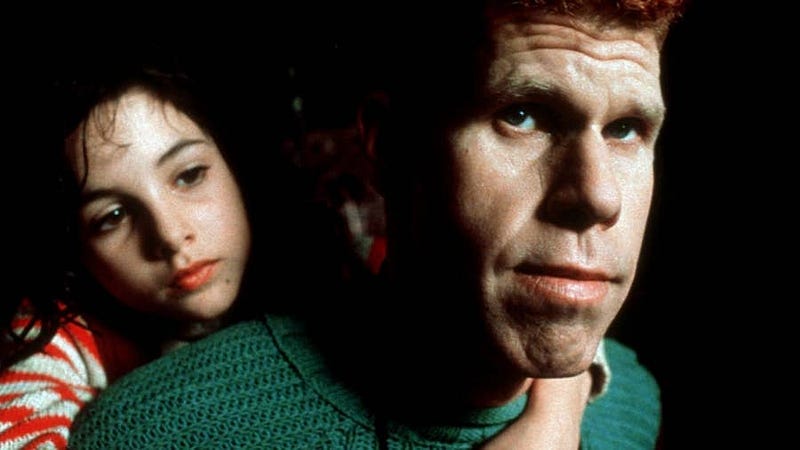
This remains one of my favorite films of all time, an intense and surreal science fiction tale that truly lacks for comparison. If some of the other films in this list can be considered “self-reflexive” (in that they are examinations of themselves and the genre in which they are considered), then The City of Lost Children is self-reflexive of the entire history of film, capitalism, and humanity. This all makes sense, given that this is from the same team that brought us Delicatessen and Amélie.
When you’re born in the gutter, you end up in the port.
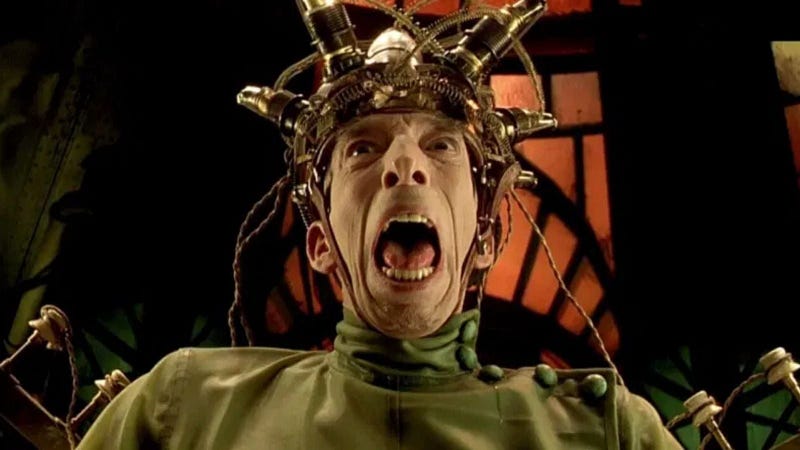
In The City of Lost Children, the dreams of children vanish into the mind of something inhuman.
Mars Attacks! (1996)
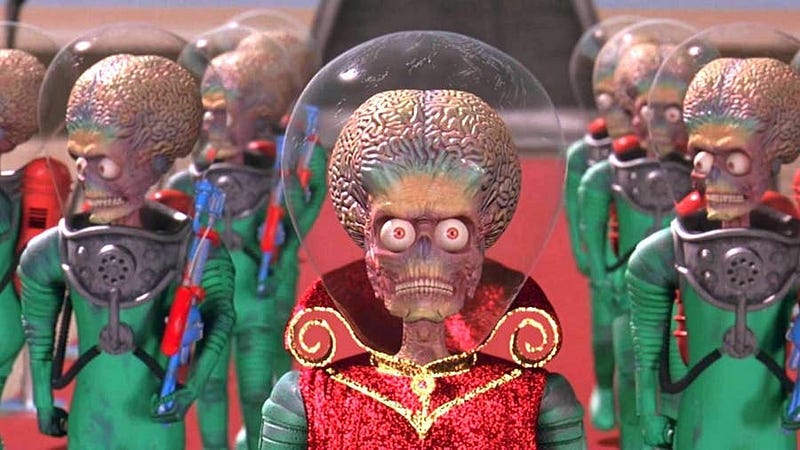
Without a doubt one of the greatest science fiction comedies of its, or any other, age — and one of Tim Burton’s finest creations. It’s a satire of epic proportion, aiming at everything from politics to pop-culture… and shooting it with a ray gun. Weird, wonderfully silly, and filled with a cast that manages to pull off something superb.
…Ack-ack!…
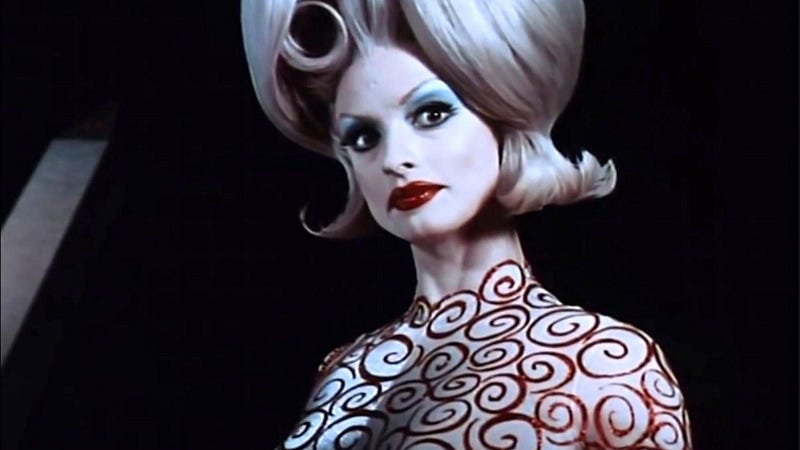
Mars Attacks! is the tale of hubris, humanity, and a whole-lotta idiots. I’m not even going to try to quantify the plot because the plot, in this case, is not the important part of the film.
Split Second (1992)
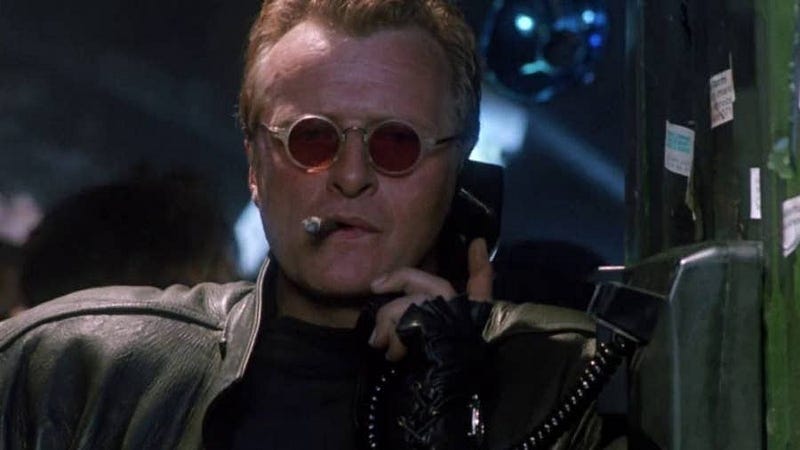
Rutger Hauer is, as I’ve said before, one of my all-time favorite actors. In a lot of his grade-B films it’s his presence alone that makes things worthwhile, but in Split Second the whole cast is really lovely and fit their roles. The writing is very far from top-notch, but the eeriness of the whole scene, coupled with some great dialog, make this a winner.
We need bigger guns!
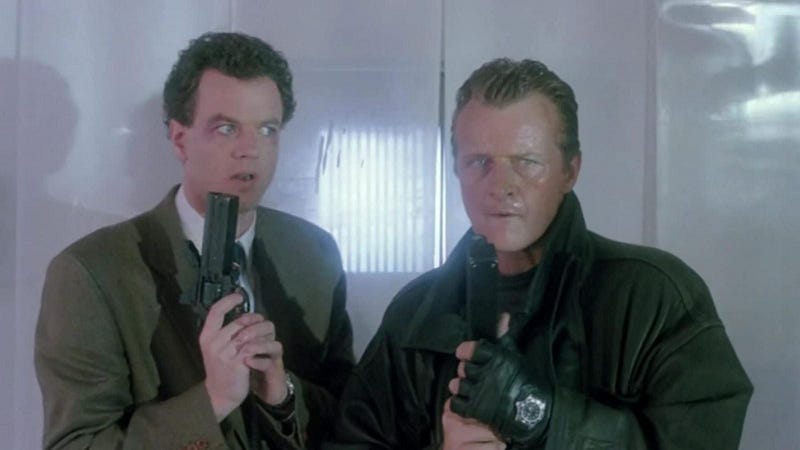
Split Second takes place in a future plagued by endless twilight from overrun pollution and the effects of climate change. In the middle of this grim reality is a police officer haunted by a monster, and who is on the hunt for his serial killer quarry before they can kill again.
